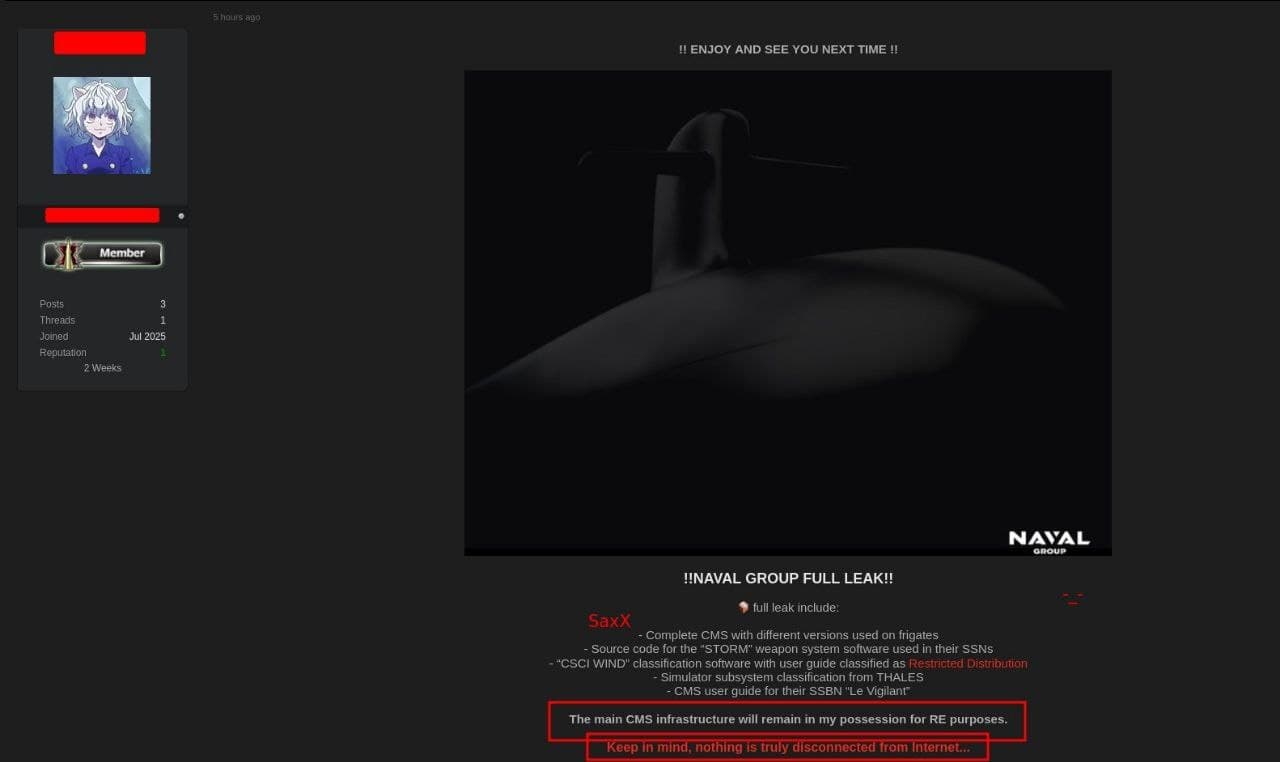Major Cyberattack Exposes 1TB of Sensitive Data from France"s Naval Group
A massive cyberattack has sent shockwaves through the French defense sector, primarily targeting Naval Group, the nation’s leading shipbuilding company. The breach has not only compromised Naval Group but has also had ripple effects on other significant players in the industry, including THALES, Dassault, and Safran. Initial reports indicate that over 13GB of sensitive internal data has already been leaked publicly, with the total data dump exceeding a staggering 1TB.
Background & Context
This recent cyberattack highlights the vulnerabilities within critical national infrastructure and defense systems. Naval Group, which specializes in the design and construction of submarines and surface ships, plays a pivotal role in France’s military capabilities. The leaked data reportedly includes sensitive materials such as the full source code for Combat Management Systems (CMS) used on French frigates and nuclear-powered submarines, weapon system software, simulation environments, and internal communications.
The implications of such a breach are severe, potentially compromising not only national security but also international defense collaborations. The attack raises urgent questions about the cybersecurity measures in place within the defense sector and the overall preparedness of critical infrastructure against sophisticated cyber threats.
Key Developments
The hacker, who operates under the alias “Neferpitou,” initially reached out to Naval Group, demanding a response within a 72-hour timeframe. When the company failed to meet the deadline, the hacker released the complete data set online for free, suggesting that the motivations behind this breach may be ideological or political rather than financial. This tactic of releasing sensitive information without monetary gain is becoming increasingly common in the world of cyber warfare, often aimed at undermining trust in governmental and military institutions.
In a statement, Naval Group acknowledged the breach and confirmed that it is actively investigating the incident. Cybersecurity experts are currently working to verify the authenticity of the leaked materials, many of which appear legitimate. As previously reported, the leaked data includes not only technical specifications but also internal correspondence and strategic documents, further complicating the defense contractor’s situation.
Broader Impact
The ramifications of this cyber breach extend beyond Naval Group, affecting the broader French defense industry and potentially impacting international collaborations. Experts warn that such leaks can embolden adversaries and pose significant risks to national security. The incident could lead to increased scrutiny and regulatory changes regarding cybersecurity practices across the defense sector.
Moreover, this situation mirrors previous instances of high-profile cyberattacks that have shaken the confidence in national security frameworks. Similar situations have arisen in the past, such as the breach of the U.S. Office of Personnel Management, which exposed sensitive data of millions of employees. The growing prevalence of cyberattacks targeting critical infrastructure underscores the urgent need for enhanced cybersecurity protocols and a reevaluation of existing defenses.
What"s Next
As the investigation unfolds, the focus will be on understanding the full scope of the breach and implementing measures to mitigate future risks. Naval Group, along with other affected companies, will likely face increased pressure to bolster their cybersecurity infrastructure and improve incident response protocols. Additionally, this incident may prompt a reevaluation of international defense partnerships and the sharing of sensitive information.
In the coming weeks, stakeholders will be closely watching how Naval Group responds to this breach and whether new policies or technologies will emerge to prevent similar attacks. The incident serves as a stark reminder that in an increasingly digital world, the integrity of national defense systems is paramount, and the consequences of negligence can be far-reaching.

![[Video] U.S. Secretary of War Hegseth directs CDAO to enforce DOW data decrees](/_next/image?url=%2Fapi%2Fimage%2Fthumbnails%2Fthumbnail-1768267268858-qe5gg-thumbnail.jpg&w=3840&q=75)
![[Video] U.S. Secretary of War Hegseth announces AI models for all networks](/_next/image?url=%2Fapi%2Fimage%2Fthumbnails%2Fthumbnail-1768266692112-e1gew-thumbnail.jpg&w=3840&q=75)




![[Video] Gunfire between Iraqi security forces and Sadr militias in Baghdad](/_next/image?url=%2Fapi%2Fimage%2Fthumbnails%2Fthumbnail-1768343508874-4redb-thumbnail.jpg&w=3840&q=75)
